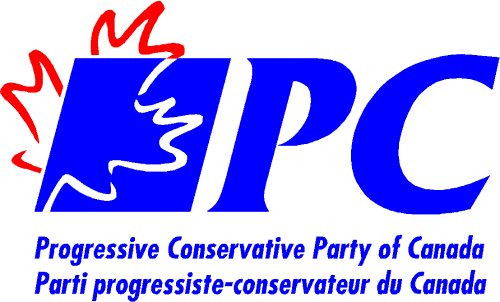The Conservative Party of Canada has undergone several name changes throughout its history. From the 1860s to the early 20th century, the forbearer of the modern political party called itself the “Liberal-Conservative Party”. The hyphen denotes the merging of two distinct political groupings that formed one new party. For a brief time, it called itself simply the “Conservative Party.” After winning the leadership in 1942, John Bracken, a former Progressive Premier of Manitoba, insisted that the party style itself as “Progressive Conservative”. The provincial Conservative parties also adopted the “Progressive Conservative” moniker – even in the Atlantic, where the Progressive Party was almost non-existent. The right united in 2003 under the new “Conservative Party of Canada”, and after nearly a decade, the provincial parties ought to follow suit – if only to eliminate the oxymoron that is “Progressive Conservative”!
The French name of the former Progressive Conservative Party of Canada serves to highlight the curious error in the English name: Le Parti progressiste-conservateur du Canada. The hyphen in between the French equivalents of “progressive” and “conservative” denotes that both of those words remain nouns. The English version, without the hyphen, turns “Progressive” into an adjective and thus renders the phrase “Progressive Conservative” a contradiction in terms. Logically, the English name should also have included the hyphen in order to denote the merger of two parties (nous) or two ideologies (also nouns). (I also prefer the French title, which would literally be rendered “Progressivist” in English, since the –ist morpheme turns abstract nouns into proper nouns.) However, the English name does not contain the hyphen, which means that “Progressive” becomes an adjective modifying the noun “Conservative.” Since ‘progressive’ generally refers to change and reform, while ‘conservative’ often means resistance to change and deference to tradition, the Progressive Conservatives created a curious contradiction.
The most infamous oxymoron in Canadian politics could have been avoided with proper punctuation!


On a somewhat lighter note, this reminds me of one of Alan Fotheringham’s famous coinages (other than “Natural Governing Party”, “Holy Mother Corp.”, “Lotusland” et al.): “the Regressive Convertibles”. Which played the seeming contradiction and its consequences to great effect.
LikeLike
Of course, because in Canada the French convention is to connect those two words, whether used as adjectives or nouns, with a hyphen, which is also the legal name of the parties. The French-language quotation simply shows that this use of the hyphen is not required by French punctuation rules, nor does it change the meaning. Usage dictates no hyphen between démocrate and libéral, but makes it optional between démocrate and socialiste or démocrate and chrétien. I used to be a translator and terminologist (Quebec and federal governments) before working in the French Index and Reference Division of the House of Commons. I also just finished adapting the French version of the revised Rules of the Senate.
LikeLike
The hyphen does in fact change the meaning, whether you want to acknowledge the inherent linguistic logic or not.
Are you trying to tell me that “extra-marital affairs” and “extra marital affairs” contain the same meaning?
LikeLike
There’s no hyphen in “extramarital”. I think the distinction you’re trying to make is between a progressive Conservative (a Conservative who is progressive) and a Progressive Conservative (= member of Progressive Conservative Party). Perhaps the distinction would have been clearer had the second expression been hyphenated instead of relying on the capital letters. But I don’t agree that the inherent contradiction between the two terms would have vanished if only a hyphen had been used.
LikeLike
That’s because you didn’t understand this blog entry. Just because you eliminate hyphens does not mean that you also eliminate the inherent meaning that they originally denoted.
The joke is that “extra-marital” refers to additional activities outside the marriage while “extra marital” means supplementary activities within it. I suggest that you read “Eats, Shoots and Leaves” in order to learn more about the subtle importance of punctuation and how it changes grammatical meaning.
LikeLike
I agree with your point that “progressive” and “conservative” are antonyms in political terminology, as are “progressiste” and “conservateur” in French. But the argument you use is flawed. In the French expression “parti progressiste-conservateur”, each of the words joined by a hyphen are adjectives, and the hyphen is not absolutely required for grammatical French. If we look at “démocrate”, we see “ds la docum. démocrate associé à différents adj. pour spécifier un parti ayant une double référence (la démocratie et un autre système), un membre d’un tel parti ou un inanimé relatif à ce parti. a) Démocrate libéral. Le parti démocrate libéral (Ginestet, Ass. parlem. europ., 1959, p. 108). b) Démocrate(-)populaire […]. c) Démocrate(-)socialiste, démoc-soc. Adj. et subst. α) (Celui, celle) qui est adepte de la démocratie et du socialisme, p. 151).” (Centre nat. de ressources textuelles et lexicales, France). Likewise, in the English expression “progressive conservative party”, both words preceding “party” are noun modifiers (i.e. adjectives) but may be used as nouns when they do not modify a noun. A hyphen in English would not change that. Compare “liberal democratic party” without a hyphen.
LikeLike
When French-language media in Canada discuss the provincial Progressive Conservative Parties, it also includes the hyphen for the nominal form. The hyphen applies whether “progressive” and “conservative” are used as nouns or adjectives.
1. “Les progressistes-conservateurs ontariens fourbissent leurs armes”
http://www.radio-canada.ca/regions/Ontario/2011/05/28/001-congres-progressiste-conservateur-toronto.shtml
2. “Nouveau-Brunswick: les progressistes-conservateurs portés au pouvoir”
http://www.cyberpresse.ca/actualites/quebec-canada/politique-canadienne/201009/27/01-4327153-nouveau-brunswick-les-progressistes-conservateurs-portes-au-pouvoir.php
LikeLike